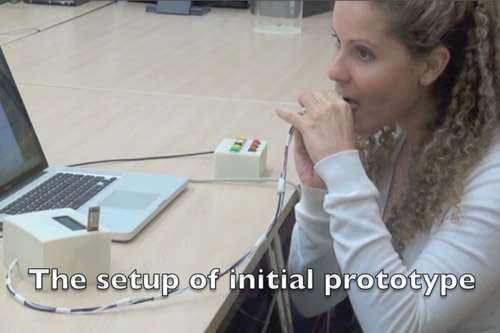Researchers are exploring new pathways into digital taste. "Instead of just looking at a cake on your screen, you can taste it." And so begins the conversation in a rather startling video that shows a man licking a cake on his computer screen and tasting the results. "A new digital simulator can reproduce the four main taste components and transmit them to the tip of your tongue. It uses an alternating current to fool your taste receptors along with small changes in temperature." This new digital simulator can reproduce the four main taste components—salt, sweet, sour and bitter—via the use of electrodes. "Tiny electrodes that heat and cool very quickly control the thermal stimulation," according to the video.
The video also suggests the system could be used in playing video games, where people would sample food. The simulator could also be part of a game reward system, where a "sweet treat would be awarded to a player who has completed a certain level. The taste device was developed by researchers at the National University of Singapore. Their team is led by Nimesha Ranasinghe, who completed his PhD at the university's department of electrical and computer engineering this year. His current research interests include digital simulation of taste and smell sensations.
Several interactive systems can be found in the literature for simulating taste sensations, especially in the area of Human-Computer Interaction, he stated. However, these solutions mostly use an array of edible chemicals to produce different taste sensations. He said that chemical use in an interactive system is unrealistic because of difficulties in storage and manipulation. He sought a new non-chemical approach to achieve, as he put it, digital control over the sensation of taste. The team's approach to taste simulations involves actuating the human tongue through electrical and thermal stimulation methods.
The method involves tongue interface, control system, and taste recording device The team presented their work last month at an ACM conference in Barcelona. Ranasinghe also foresees healthcare applications as another possibility. According to New Scientist, he could see people with diabetes turning to the taste synthesizer to simulate sweet sensations with no effect on their blood sugar levels. He also suggested that cancer patients experiencing chemotherapy could use it to improve or regenerate a diminished sense of taste.
More information: nimesha.info/
via Newscientist
© 2013 Phys.org



















